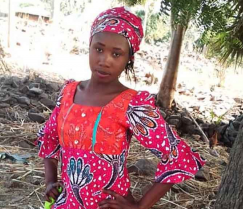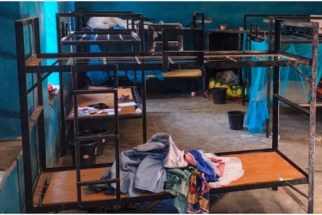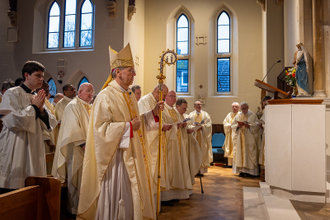Nigeria: Time for Britain to act

Schoolgirl Leah Sharibu, still in captivity two years after refusing to convert to Islam. She's been raped and now has a baby.
The All-Party Parliamentary Group for International Freedom of Religion or Belief (APPG) has launched a new report in Westminster today entitled: Nigeria - Unfolding Genocide?
The report launch featured speeches from the Chair of the APPG, Jim Shannon MP, Co-Chair Baroness Cox, and Rebecca Sharibu, the mother of Leah Sharibu who was kidnapped by Boko Haram two years ago and has yet to be released.
The APPG concludes that more Christians are being killed by Fulani militias in the Middle Belt of Nigeria than by the more well-known Boko Haram Islamist insurgents in the mainly Muslim north. Given that the Nigerian government receives GBP 800,000 a day in aid, the group wants the authorities to do more to protect unarmed civilians.
The Parliamentarians set out to examine the roots of the violence perpetrated by mainly Muslim herdsmen against mainly Christian farmers. The report concludes that climate change, desertification and a rapidly growing population threatens the livelihood of pastoralists, leading them to move their herds onto farmland. Problems that were previously resolved with traditional mediation have turned deadly due to the availability of cheap weapons from conflict zones in neighbouring countries. The report concludes that herders are emboldened by unscrupulous politicians and extremist Muslim clerics to destroy Christian villages and churches, targeting pastors, and carrying out "ritual slaughter" and mutilation.
According to Open Doors, between November 2016 and October 2019, there have been 7,081 recorded murders of Christians and 26,406 assaults; 741 churches and 37,064 Christian-owned businesses and homes have been attacked. The Global Terrorism Index ranks Nigeria as the world's third most terrorism-affected country.
The Parliamentarians recommend that UK aid is focused on reforms allowing herders and farmers to coexist, including environmental measures and the education of nomads. They call for UK assistance to be focused on funding local non-governmental organisations running effective reconciliation programmes, and training state officials to better manage resources.
However, the conclusions most likely to rankle the Nigerian government concern the role of its police and army. Based on its research, Amnesty International concludes the security services demonstrate "at least, willful negligence; at worst, complicity" in attacks on Christians.
Testimony from a former Nigerian army chief of staff confirms fears that the armed forces are "not neutral, they collude" in "ethnic cleansing" by well-armed Fulani militia. Survivors interviewed by the Parliamentarians told of security services repeatedly ignoring advance warnings of attacks on Christian villages, or withdrawing just before Fulani assaults begin.
The Nigerian House of Representatives designated the treatment of Christians in the Middle Belt as genocide in 2018. Yet, there is resistance to acknowledge the sectarian element in the crisis among some Western commentators and government officials, although attackers frequently shout "Allah u Akbar" (God is great) and carry the Islamic flag. According to the testimony of one local leader whose village was destroyed in 2019, "Why did the Fulani leave Muslims who are farmers and attack only Christians if this is not a religious issue? There is more than grazing land or a farmer and herders' fight over land."
The All-Party Parliamentary Group's report is dedicated to Leah Sharibu, the abducted schoolgirl who refused to convert to Islam. While her Muslim classmates were released, Leah remains a hostage, and has given birth to a child resulting from being raped by her captors.
LINKS
Nigeria - Unfolding Genocide report: https://appgfreedomofreligionorbelief.org/media/200615-Nigeria-Unfolding-Genocide-Report-of-the-APPG-for-FoRB.pdf
APPG New report launched - https://appgfreedomofreligionorbelief.org/nigeria-unfolding-genocide-new-appg-report-launched/
APPG - https://appgfreedomofreligionorbelief.org/
Global Terrorism Index - http://visionofhumanity.org/app/uploads/2020/06/GPI_2020_web.pdf


















